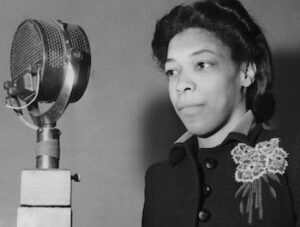
Una Marson
*Una Marson was born on this date in 1905. She was an Afro Caribbean feminist, activist, and writer who produced poems, plays, and radio programs.
Una Maud Victoria Marson was born in Sharon village, near Santa Cruz, Jamaica. She was the youngest of six children of Solomon Isaac Marson and Ada Wilhelmina Mullins. She had a middle-class upbringing and was an avid reader of available literature, mostly English classical literature at the time. At age 10, Marson was enrolled in Hampton High. Her father died that year, leaving the family with financial problems, so they moved to Kingston. She finished school at Hampton and worked in Kingston as a volunteer social worker.
She used the secretarial skills, such as stenography, that she had learned in school. In 1926, Marson was appointed assistant editor of the Jamaica Critic. Her years there influenced her political and social opinions and inspired her to create her publication; in 1928, she founded her magazine, The Cosmopolitan, which printed articles on feminist topics, local social issues, and workers' rights aimed at a young, middle-class Jamaican audience. Marson's articles encouraged women to join the workforce and to become politically active. The magazine also published Jamaican poetry and literature.
In 1930, Marson published her first collection of poems, entitled Tropic Reveries, that dealt with love and nature with elements of feminism. It won the Musgrave Medal from the Institute of Jamaica. In 1931, due to financial difficulties, The Cosmopolitan ceased publication. She published another poetry collection, Heights and Depths, and wrote her first play, At What a Price; the play opened in Jamaica and later in London to critical acclaim. In 1932, she decided to go to London. When she first arrived in the UK, Marson found that racism restricted her ability to find work. She stayed in Peckham, south-east London, at the home of Harold Moody, who had founded the civil-rights organization The League of Coloured Peoples.
The League sponsored a production of Marson's play At What a Price in London in the winter of 1932–33. It opened at the YWCA Central Club Hall in London on November 23, 1933. It ran in 1934 at the Scala Theatre on Charlotte Street and Tottenham Court Road. From 1932 to 1945, Marson moved back and forth between London and Jamaica. She continued contributing to politics but wrote for newspapers and her literary works. One of her new emphases was on the race issue in England. Outside of her writing, Marson was at the London branch of the International Alliance of Women in London and Istanbul. Marson returned to Jamaica in 1936 to promote national literature. One step was to help create the Kingston Readers and Writers Club and Drama Club. She also founded the Jamaica Save the Children Fund. In promoting Jamaican literature, Marson published Moth and the Star in 1937.
Many poems in that volume argue that black women should be confident about their beauty. This theme is in "Cinema Eyes," "Little Brown Girl," "Black is Fancy," and "Kinky Hair Blues." Marson worked with Louise Bennett to create another play called London Calling. Also, in the feminist vein, Marson wrote Public Opinion, contributing to the feminist column. Marson's third play, Pocomania, is about a woman named Stella looking for an exciting life; it represents a turning point in what was acceptable on the stage. In 1937, Marson wrote a poem called "Quashie comes to London," which shows how a writer could implement Caribbean dialect in a poem. It is this usage of local dialect that situates Quashie's perspective of England as a Caribbean perspective.
Marson returned to London in 1938 to continue work on the Jamaican Save the Children project that she started in Jamaica and to be on the staff of the Jamaican Standard. In 1941, she worked at the BBC Empire Service on the program Calling the West Indies, in which World War II soldiers would have their messages read on the radio to their families, becoming the program's producer by 1942. During the same year, Marson turned the program into Caribbean Voices, a forum where Caribbean literary work was read over the radio. Through this show, Marson met authors and global activists such as J. E. Clare McFarlane, Vic Reid, Langston Hughes, James Weldon Johnson, Jomo Kenyatta, Haile Selassie, Marcus Garvey, Amy Garvey, Nancy Cunard, Paul Robeson, T. S. Eliot, Tambimuttu and George Orwell, who helped Marson edit the program before she turned it into Caribbean Voices.
Details of Marson's life are limited, and those about her personal and professional life post-1945 are particularly elusive. In 1945, she published a poetry collection entitled Towards the Stars. Critics have both praised and dismissed Marson's poetry. Marson was active in the West Indian writing community during that period. Her involvement with Caribbean Voices was important to publicizing Caribbean literature internationally, as well as spurring nationalism within the Caribbean islands that she represented. Sources differ in outlining Marson's personal life during this time. Lee M. Jenkins says Marson went to Israel for a women's conference, an experience she discussed in her last BBC radio broadcast for Woman's Hour. With the conflicting details regarding Marson's personal life, it isn't easy to understand all of Marson's accomplishments during the final two decades of her life.
Una Marson died on May 6, 1965, in Kingston. Marson's poetry was included in the 1992 anthology Daughters of Africa. 1998 Delia Jarrett-Macauley published the original full-length biography The Life of Una Marson, 1905–1965. In 2022, Douglas Road Productions made a documentary entitled Una Marson, Our Lost Caribbean Voice, broadcast on BBC Two television. The Una Marson Library was opened by Southwark Council near the Old Kent Road in south London in 2024 as part of the redevelopment of the Aylesbury Estate in south London, recognizing Marson as a "local hero."
To Become a Radio Announcer
To Become a Desktop Publisher
To be a Writer